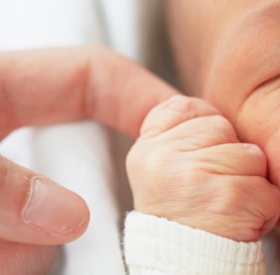Article at a Glance
Holding your newborn baby for the first time it is natural to want to count all the fingers and toes to make sure that everything is okay. But what about the problems you can’t see?
Luckily in Utah there is a set of screenings that are required by law that test for some of the most serious birth defects—problems that if caught early can make a tremendous difference in the health of a child. Early intervention can prevent things like failure to thrive, brain or organ damage, and possibly save lives.
For years hospitals have been performing a hearing screening and blood test that screens for 38 different disorders, but as of October 1, 2014, a new law in Utah requires newborns to be screened for congenital heart defects as well.
Many of the conditions screened for are rare, but very serious. Screening is such an easy thing to do when you consider the difference it makes. For Zachary, born in 2003, catching his rare condition SCID (severe combined immunodeficiency) at birth saved his life. Years earlier his older brother Ryan was born with the same condition, but wasn’t diagnosed until it was too late. Having Zachary screened as a newborn saved his family the pain of losing another child. More than anything, it is stories like this that show us how lucky we are to have this kind of screening available.
But the screening performed in the hospital is just one step of the process. Two weeks later newborns need to be seen again by their pediatrician for the second phase of the screenings and to follow up with any results. The American Academy of Pediatrics recommends that newborns are seen at 3 to 5 days old, two weeks old, and every couple of months after that (see well child visit schedule).
By receiving prenatal care, having your baby screened at the hospital, and scheduling all your well child visits, you can intervene before your child develops any serious symptoms or any conditions become fatal.
Screening for Critical Congenital Heart Disease (CCHD)
This screening is simple, fast, and painless. A sensor is placed on the baby’s wrist and foot to measure how much oxygen is in the blood.
One in every 835 babies born in Utah have CCHD. Usually it is caught prenatally with ultrasounds, but this screening can help catch cases that may have not been identified. Early detection is vital for CCHD. A delayed diagnosis seriously jeopardizes the health of the baby and can even lead to death.
Hearing Screening
The process of developing language and social skills begins long before a child learns how to talk. The sooner you can identify hearing loss, the sooner you can begin intervention services. The screening is easy and painless, and is often performed while the baby is asleep.
Newborn Screening
Formerly called the “PKU test” because it tested for phenylketonuria, this blood test is now called “Newborn Screening.” In Utah, it tests for 38 conditions, which include endocrine, metabolic, and hematological disorders. The goal is to diagnose the disorder before a baby begins to experience symptoms. This allows doctors to intervene before things like brain or organ damage, stunted growth, sepsis, mental retardation, or severe anemia occur.
This blood test requires just a few drops of blood from your baby’s heel that is then sent to the lab. The first screening is done between the first 48 hours to 5 days of life. The second screening occurs when your baby is between 7 and 28 days old.
Your Results
If the results of the tests are negative, it means your child does not show any signs of the conditions tested for. A positive result doesn’t necessarily mean your baby has a condition, but it does mean that your baby will need additional testing. Be sure to talk to your pediatrician right away to make sure your baby receives any needed treatment.
More Information:
All Utah Newborns Now Screened for Critical Congenital Heart Disease
